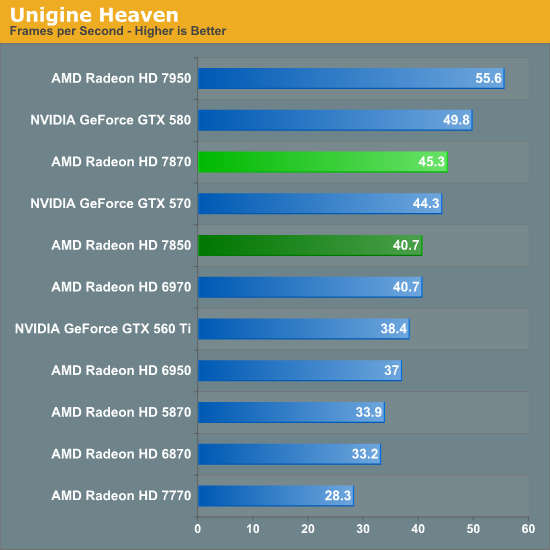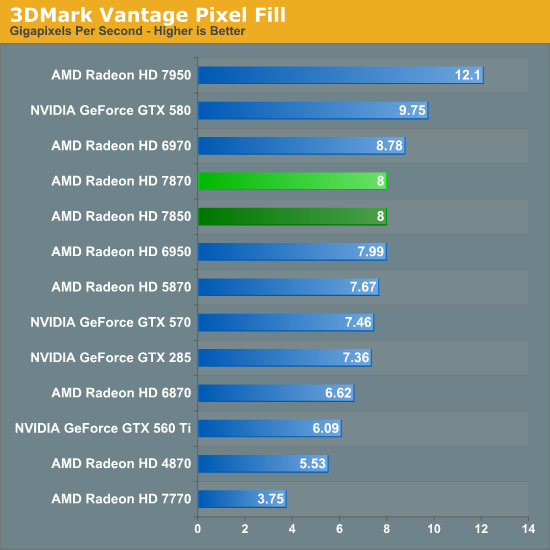AMD Radeon HD 7870 GHz Edition & Radeon HD 7850 Review: Rounding Out Southern Islands
by Ryan Smith on March 5, 2012 12:01 AM ESTTheoretical Performance
Before moving on from compute performance, we wanted to quickly take a look at theoretical performance. This will be particularly helpful for highlighting the importance of core clockspeeds in AMD's GCN architecture.

We’ll start with a quick look at tessellation performance with the DX11 Detail Tessellation sample program. Because the 7900 series and the 7800 series share a common dual geometry engine frontend, geometry performance is almost entirely dictated by the core clock. As a result the 7870 and its 1GHz core clock just edges out the 7950 and its 800MHz core clock when it comes to tessellation performance. The rest of the difference comes down to shaders, where the 7950 has more shader resources to throw at the hull and domain shading parts of the tessellation process.

Of course that tessellation performance lead doesn’t always translate into great performance in tessellation heavy benchmarks. Unigine Heaven, in spite of its heavy use of tessellation still has the 7950 well ahead.


Finally, a quick look at 3DMark Vantage theoretical performance largely confirms what we’ve already seen. Pixel fill is heavily bandwidth limited, leading to the 7950 taking a large lead and even the 6970 edging out the 7800 series, though you’d never know it from the gaming benchmarks. Otherwise when it comes to texture fillrate, the 6970 and 7870 are in a dead heat.










173 Comments
View All Comments
Kaboose - Monday, March 5, 2012 - link
7870, beats GTX 570 and is about even with the GTX 580, uses 150watts less power at load, is quieter, is cooler, and has idle power draw > 23watts less. How is this a disappointment? The only disappointment i see is the price which is the result of no competition from Nvidia.Kiste - Monday, March 5, 2012 - link
A new generation of GPUs used to give us a whole hell of a lot more performance at any given price point. The current AMD stuff does not and that is a disappointment.Case in point: you even have to talk these things up by basically saying "oh, well, at least they draw less power".
Kaboose - Monday, March 5, 2012 - link
dropping power consumption by over 50% is something of a gimmick? Dropping load temps by 14c compared to the GTX 570 is not significant? 14c is a fairly large degree of deference, this gives higher room for overclocking as well as a cooler system overall. When Nvidia releases Kepler and we have both companies with 28nm then we can (hopefully) see some competition in price. In my opinion the 7870 at $325 would be a great card right now. Once Kepler is out $285-300 I think would be nice. I agree it is over priced right now however.If Nvidia releases Kepler and gives us a LOT more performance over last generation then I will concede that the 7xxx series is a failure. However from the way AMD is behaving it doesn't appear Kepler is going to do much in terms of raw performance either.
Kiste - Monday, March 5, 2012 - link
While reducing power consumption might not be a gimmick, it is the result of the new process node and thus in itself not particularly impressive, especially when you more or less keep the performance the same as with the previous generation.I'm still not impressed, sorry. Price/performance plain and simply sucks ass with these cards, barely beating the stuff that's on the market right now in that regard.
And even with the high-end SI cards there's barely much of a performance boost compared to what's already been on the market for months.
Sure, less power draw is nice. I won't complain about it but if a brand new generation of GPUs comes out and I am not even one little bit compelled to upgrade from my aging, heavily overclocked GTX570, then something is cleary wrong here.
Exodite - Monday, March 5, 2012 - link
We'll just have to wait and see what Nvidia provides when they finally decide to put competition on the market, won't we?I'd happily agree to finding the 7900-series not as high-performing as I'd like, and the 7700-series too expensive.
From the reviews I've read so far the 7800-series, the 7850 especially, is pretty much the perfect card ATM.
Low power, low noise, cool, 2GB VRAM and runs between a 560 Ti and 570 in performance.
It's definitely the card I'd recommend to anyone at this point, especially given the fact that we'll see better coolers than AMDs atrocities once we get release versions.
Iketh - Monday, March 5, 2012 - link
You must live in a cold climate. You're happy with a heavily overclocked 570?? I live in FL, and that card increases my power bill $30-$70 each month over my 6870 during 3 of the 4 seasons, and I'm talking from experience. Do you have any idea how hard an A/C has to work in a small 2 bedroom house to counter the blast of heat from an overclocked gaming rig??If you live in a hot climate, test it for yourself.
You don't compare just the power draw of the cards themselves....
Kiste - Monday, March 5, 2012 - link
I'm not quite sure if you're actually expecting a serious answer to that kind of hyperbolic drivel.Jamahl - Monday, March 5, 2012 - link
You really don't get it do you? These cards REALLY DO heat up rooms. Where do you think the heat goes? Ever heard of the law of conservation of energy?londiste - Monday, March 5, 2012 - link
oh damn, i need to get two of those, maybe they'll reduce my heating bill at winter :)Kiste - Monday, March 5, 2012 - link
Spelling "really do" in capital letter doesn't make it any more less ridiculous a statement.My whole PC (GPU, OCed CPU, 4 HDDS) draws slightly more than 300W under typical gaming loads. You can't "heat up a room" with that, much less with just the GPU.